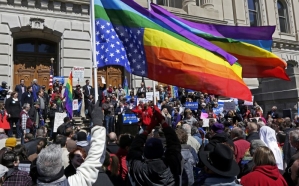
The Republican-controlled legislature in Arkansas recently passed a state version of the Religious Freedom Restoration Act in overwhelming numbers. After making a few changes, Gov. Asa Hutchinson has signed the controversial bill into law on Thursday.
According to Kevin Trager and Alyse Eady of KTHV-TV, the revised legislation passed the state House 76-17; Hutchinson signed the bill a half hour later. The law goes into effect immediately and closely mirrors the federal version.
"Once you looked at the original bill, it was the broadest bill, the most extreme version of a religious freedom act in the country," University of Arkansas at Little Rock law professor John DiPippa said. "Making it more narrowly tailored to the federal bill makes a lot of sense."
Alliance Defending Freedom senior legal counsel Jim Campbell praised the governor's decision to sign a revised RFRA into law.
"Government should protect people's freedom to follow their beliefs in their lives and work. We commend the governor's decision to support a law that does this," Campbell said in a statement. "Government shouldn't be able to punish Americans for exercising basic civil rights."
Campbell added that the new law passed in Arkansas "would ensure that freedom gets a fair hearing," noting that it would "limit the government's power to intrude on our liberties."
According to Laura Meckler and Ana Campoy of the Wall Street Journal, Hutchinson hesitated to sign the original bill due to public backlash and criticism over a similar law signed by Indiana Gov. Mike Pence last week. The original version of the law apparently brought up a modern cultural clash as to which groups deserve extra legal protection, religious people or gays and lesbians.
"The issue has become divisive, because our nation remains split on how to balance the diversity of our culture with the traditions and firmly held religious convictions," Hutchinson said, adding that the bill's language should make it clear that Arkansas does not tolerate discrimination.
Some legal experts told the Wall Street Journal that the original versions of RFRA in both Indiana and Arkansas were more expansive than the other laws. About 20 states and the federal government have RFRA laws, which mostly state that "any government infringement on a person's religion would face strict scrutiny from courts."
"The Arkansas bill, for example, has a broader definition of religious exercise and allows those who claim to have been grieved to sue any entity under the law, even if that entity isn't part of government," Meckler and Campoy wrote.
Jon Herskovitz of Reuters reported that Arkansas lawmakers have stepped up to meet the governor's challenge in a quick manner. Some gay rights activists thought more action was needed to protect the LGBT community.
"From a practical perspective, what difference does this bill make?" social activist Rose Adams said. "There is still no protection against discrimination against LGBTs in state law."
Herskovitz noted that many groups have urged Hutchinson to veto the original measure, including the world's largest retailer, Arkansas-based Wal-Mart Stores Inc. However, Jerry Cox, president of the Arkansas Family Council, indicated that his group was willing to accept the new revisions.
"The original religious freedom bill was the Rolls-Royce of religious freedom laws," Cox said in a statement. "The replacement bill is a Cadillac."
According to the Wall Street Journal, nearly half the states have some sort of legal protections for the LGBT community. However, business and individuals who live in states lacking such laws are free, in theory, to discriminate based on sexual orientation, even without a religious freedom law.
"In states that protect gays and lesbians from discrimination, it is unlikely that a religious-freedom law would make it possible to deny employment or services based on sexual orientation," Meckler and Campoy wrote.
The Wall Street Journal reported that both sides of this cultural issue expect the U.S. Supreme Court to settle the matter regarding the constitutionality of same-sex marriage in June. If the high court declares such unions as constitutional, same-sex marriages would be the law of the land everywhere.






